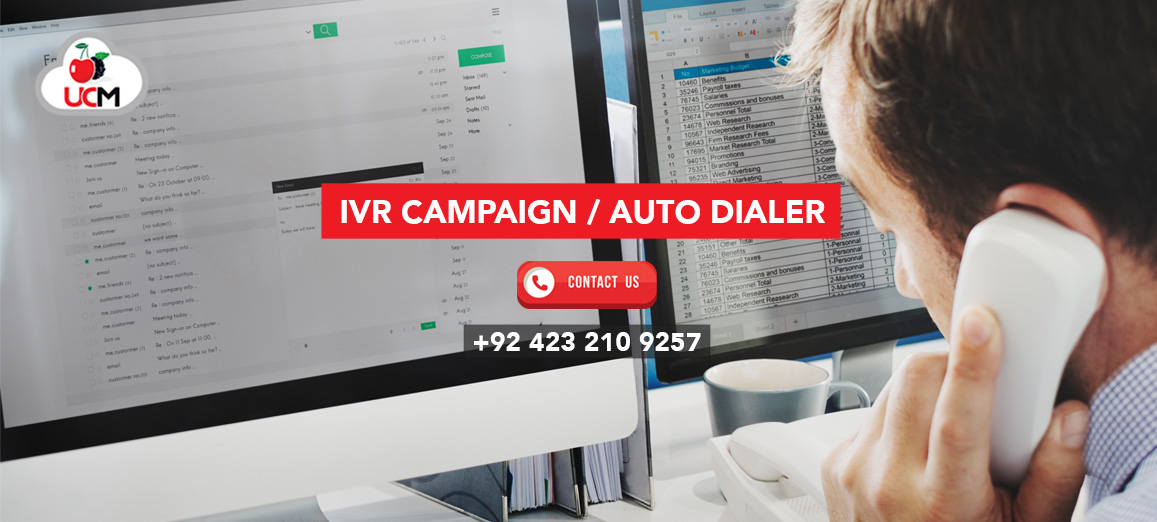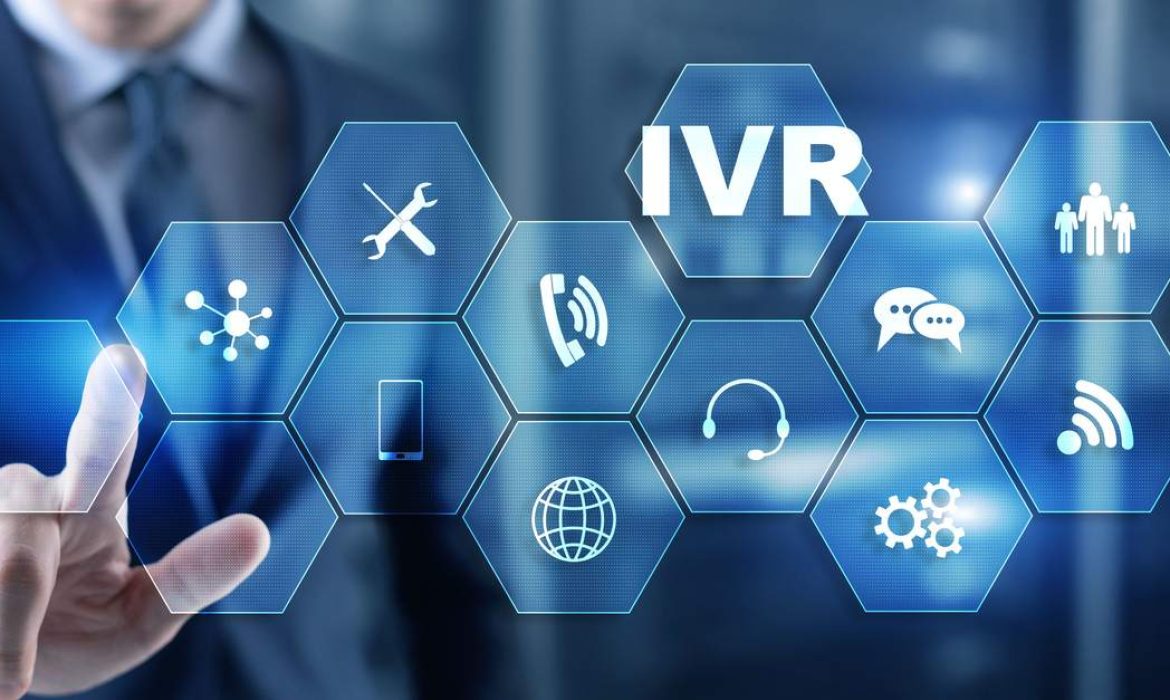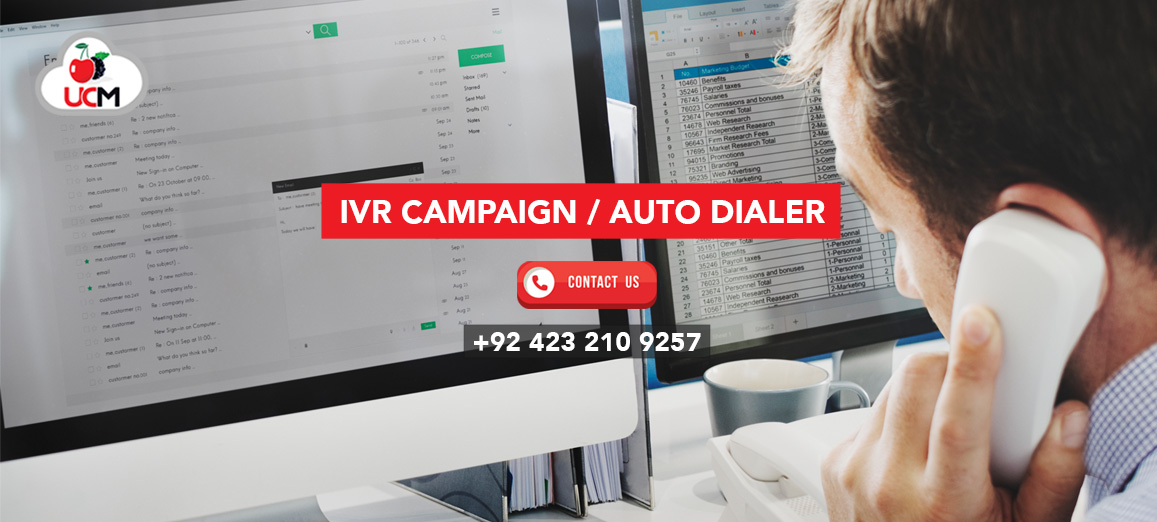Potential of Inbound Call Management Software For Your Business
An Overview of Inbound Call Management Software
Offering quality customer service is important for every company looking to survive and thrive on a competitive curve. Meanwhile, responding to every customer issue can be challenging especially when you have to manage a high volume of calls in a day. Your customers expect exceptional services from your business but you may lack call center agents to resolve their issues quickly. Here Inbound Call Management Software emerges as an ultimate solution for your business that enables agents to respond to customer calls in a timely manner and enhance productivity. A call center is not only about picking up calls as it allows you to monitor, track and manage your customers efficiently. The software allows businesses to set up, manage and streamline their inbound call processes to offer a personalized experience. Let’s learn more about the benefits of this technology for your business.
What is the Inbound Calling Process?
When a customer initiates a call to a business or a call center, it is called an inbound call. The business help desk manages incoming customer calls made to resolve queries, technical assistance or upgradation of services. Some call centers manage inbound or outbound calls separately while others completely. They measure call center agent efficiency based on different metrics like average handle time, first call resolution etc. Nowadays, inbound call center agents also communicate with customers through various modes of communication like chat, email or social media. They are different from outbound call centers. For instance, inbound call centers handle incoming customer calls to resolve issues of existing customers. On the other hand, outbound call center agents initiate calls to customers for telemarketing, lead generation or other business purposes. Companies can streamline their inbound call processes by investing in Inbound Call Management Software.
Benefits of Call Management Software
1. Enhances Customer Satisfaction
All customers want to feel valued from their first interaction with the company. Inbound call center technology allows the routing of customer calls to the most relevant agent to reduce wait times. Call center administration can monitor calls and record the conversation for later review and training purposes. All these efforts help to enhance customer service by improving the quality of the calls and retention rate.
2. Ensures Efficient Operation
Access to the latest tools and software allows your team to spend their time focusing on customer service, especially on improving the speed and quality of the service. An Inbound Call Management Software lowers operational costs and maximizes agent productivity. Administration can manage their resources more efficiently and take the benefit of scalability and flexibility with cloud-based technology.
3. Allows Easier Management of Bulk Call Volume
The businesses that have to deal with high call volume in routine, an inbound call system can maximise their efficiency. They can handle the bulk volume of incoming customer calls without compromising on quality. This means your customers can get the required help even during busy hours. Your loyal customers can share their good experiences with others and contribute to your business marketing.
4. Reduces Wait Times
The longer your customer has to wait on call, the more disappointment they show with your service. According to a study, the impacts of negative experiences are more lasting than positive ones. That is why reducing wait time is an important factor to consider for call centers. The inbound call management system increases your call center performance and reduces wait times by routing calls to the most available agents.
Final Remarks
Indeed, Inbound Call Management Software is an ideal solution to meet your dynamic customer needs. If you are looking for a service to get this technology or to manage your inbound call center processes efficiently, consider Cherry Berry UCM to ensure a top-notch customer service experience.
Benefits of Outsourced Call Center Services for Various Industries
Why are Outsourced Call Center Services Important?
Today, many businesses believe that the only way to keep their customers satisfied is to manage all call center processes in-house. Although it seems handy to have a team of experts ready to manage both incoming and outgoing calls, the growing competition and dynamic customer expectations have increased the value of Outsourced Call Center Services. According to an estimate, the outsourcing market of call centers will likely grow by $14.05 billion between 2021-2025. Thus, companies can thrive well while entrepreneurs and business owners can achieve their tasks with maximum proficiency by outsourcing their call-related operations and focusing on core competencies. Let’s take a look at how outsourcing can be advantageous for your business.
Advantages of Outsourced Call Center for the Telecom Sector
Outsourcing your call center services means hiring a team of experts to help your business connect with the customers even after closing hours. They can help you formulate marketing strategies to make sales and meet business goals. Specialized agents can also track your customer needs and demands so you can provide what they exactly need. Call centers hire expert agents in the field who offer personalized customer service to let the customer feel valuable. This increases customer’s loyalty to your telecom business.
Benefits For the Government & Education Sector
Government institutions can outsource their call-answering processes to a specialized service provider. This step will allow people to get information about different government schemes within no time. In this way, the government can manage various complaints timely, address people’s grievances efficiently, and effectively offer solutions to different issues. The education sector can manage its appointment settings and meetings through call center services to save time and money. Some call centers also offer course enrollment and registration to enable the students to understand the whole process without physically visiting an institution. Likewise, students can reach emergency services or place book or food orders using these services.
Significance for Restaurant and Travel Industries
Travel companies can outsource their call center operations for cost savings, enhanced customer service and scalability. These service providers not only manage your customer’s incoming calls efficiently but also address their concerns, ensure efficient handling of issues and offer all travel-related information. Moreover, outsourcing services also help customers book tickets or make reservations in restaurants with ease. Restaurants can easily manage orders on call and offer personalized services during peak hours by teaming up with experts.
Importance for E-Commerce & Healthcare Sectors
Customers expect a high level of support so businesses can offer excellent customer service experience through Outsourced Call Center Services. These services not only keep your customer engaged but also ensure your customer remains loyal to an e-commerce service. They can help to address your customer concerns in an efficient manner which your in-house teams may not handle properly. Call center agents related to the pharmaceutical sector can also give you detailed information about the dosage of a particular medicine. Moreover, they can also schedule appointments with doctors and remind you about it.
Final Thoughts
Although people from specialized industries have a significant role in growth, they cannot work as customer service agents due to a lack of effective communication skills and specialized skills needed to manage incoming and outgoing calls. These deficiencies can affect the performance of your call-related operations and also cause loss of money and resources. For that reason, many industries prefer Outsourced Call Center Services to provide the high level of services their customer expects. Thus, outsource your call center operations to a reliable and trustable service provider like Cherry Berry UCM to meet your customer expectations efficiently.
Dealing with Stress? Move to Cloud Base Call Center Solutions
Why is Cloud Base Call Center Solutions a Smart Investment?
High call volume and performance expectations have made the life of call center agents very stressful while the situation becomes worse when they have to face customers who react to things differently. However, companies can reduce the burden on their call center agents and make them more productive through Cloud Base Call Center Solutions. These solutions serve as a hassle-free customer support platform loaded with latest technological tools to help communicate with customers over the phone, social media, email and more. More interestingly, companies can integrate their call center software with existing business applications to ensure efficient workflow across organizations. Cloud call centers allow agents to receive and make calls via the Internet and streamline customer communication with advanced features that you cannot expect from an on-premises phone system. However, choosing the best software is a challenging feat but the right decision can enable you to manage every request efficiently.
How Does Cloud Call Center Work?
It manages both incoming and outgoing customer calls, social media interaction, text messages, video communication and live chat efficiently through the Internet. Call center service providers are responsible for equipment, technical set-up and maintenance. This is why investing in cloud-based contact center technology is a cost-effective solution for businesses having tighter budgets. In the traditional PBX system, companies need telecom hardware but the latest VoIP technology enhances your agent productivity as all the communication is managed over the Internet. Interestingly, you can integrate cloud call center software with other business applications and social media platforms seamlessly. Its integration with CRM software keeps all data stored at one central location which your agent can get before or during calls to offer personalised services. As it entirely works over the internet, therefore, your agents can work remotely through the headset and internet connection.
How Does This Technology Reduce Agent Stress?
Before cloud technology, all customer communications were siloed among different teams and departments. However, now your agents and all teams can access the details of customer communication on one platform. Earlier, customers could connect with a business only through calls which meant missing a single call led to missing a sales opportunity. Today, customers can reach your business through various communication channels other than calls which reduces your agent burden. Formerly, your customers had to spend time on hold to talk with the available agent which leaves them frustrated. At present, call center technology automatically routes calls to the most available agents to reduce hold time and ensure quality services. In the traditional call center setup, the analysis of agent performance was difficult but now real-time monitoring enables administration to meet their agent training needs efficiently.
Significance of Cloud Base Call Center Solutions
The comparison between landline and VoIP shows that the latter requires lower setup and ongoing costs so they are more affordable than the prior option. Moreover, Cloud Base Call Center Solutions allow companies to work from anywhere in the world from office or home. Companies can stay in touch with teams regardless of location. This technology puts your agents in the driving seat with a dashboard tuned for managing customer inquiries efficiently. Moreover, the click-to-call feature reduces the chances of misdials and the use of IVR technology helps to resolve common customer queries without the need for an agent that reduces their workload. The integration of customer relationship management software also boosts your agent’s efficiency as they can view their customer data before or during the call for personalized interaction.
Conclusion
Looking for highly efficient Cloud Base Call Center Solutions to reduce your agent stress? Do you want to move from traditional technology to the latest one for unmatched scalability? Team up with Cherry Berry UCM to offer top-notch customer service experience and meet their growing expectations.
Exploring Significant Features of Call Center Management Software
What is Call Center Management Software?
Smart companies always focus on applying strategies that can eliminate costs and enhance efficiency. Investing in call center software is one such effective way and cost-effective approach to manage customer communication across organizations and various communication channels efficiently. Focusing on call-related processes is important because communication over the phone is more difficult than social media interaction, SMS or email due to direct interaction with customers. Agents have the responsibility to provide the right answers to customer queries without any pause or losing focus. Thus, with Call Center Management Software, companies can streamline their inbound and outbound call center processes and can offer superior customer support. This software enables your agents to meet customer expectations with minimal effort. It automates the flow of incoming and outgoing calls to enhance agent efficiency and call center performance. Let’s learn more about the features of this software.
Important Features of Call Center Management Software
Before moving ahead to invest in call center technology, it is essential to consider why your business needs call center software. You should know how this software will help your calling team in resolving their issues. Here is the list of essential features which most of the companies want to have in this software.
1. Automatic Call Routing
A contact center software automated the process of both inbound and outbound calls. Call centers can use IVR or interactive voice response systems to present menu options, and create greetings and answers to frequently asked queries to resolve customer issues electronically. An IVR technology also connects the customers calling for support to the most relevant agent at the push of a button. Likewise, your customers can also access simple information like business closing hours or address details without talking to the agent. This helps your agents to manage complex inquiries and reduces call wait time.
2. Integration with CRM Technology
Besides the IVR system, the Call Center Management Software can also be integrated with your sales and marketing CRM software to maximize efficiency. This integration empowers companies to forward their calls, get detailed information about the customer on call and prioritize calls based on their importance. It ensures that your agents remain proactive while calling prospects to provide personalized services. As this technology provides you with all the information you need about your customers, your agent efficiency increases as a sales agent.
3. Automated Call Distribution
Your agents can be busy with leads and customers when any other customer places a call in your call centers. The automated call distribution feature ensures the routing of calls to only relevant and available agents instead of queuing other busy agents. Additionally, companies can also preset call distribution considering different parameters like time and location of call.
What Else to Expect?
4. Auto-Recording
Companies want to know the quality of their calls and the way agents handle customers on calls. Listening to the conversation is the only way to achieve this feat. This need has prompted call centers to record both inbound and outbound calls, a significant feature of today’s call centers. With auto-recording features, call center administration can measure their agents and call center performance and can take the right course of action to ensure quality services. This feature is also important for training and coaching purposes.
5. SMS Tracking & Voice or Email Transcription
Sometimes, messages get lost in communication on calls. However, companies can utilize the potential of an SMS tracking feature to monitor messages sent to or received from prospects or leads. They can also figure out some messages that can be converted into automatic scripts so the company can send them to customers in case customers are not able to receive calls. Call center software also enables agents to get the transcript of calls and online chats. This facility further helps in quality control and customer engagement.
6. Real-Time Analytics & Reporting
Call centers use multiple communication channels to communicate with customers. With real-time reporting features, administration can get detailed reports of their call center performance and agents. They can get information about the number of calls made or received, call duration and their quality. This insight helps businesses to make date-backed decisions and fix general issues with their call center team of agents.
7. Flexibility & Versatility
Contact center software provides flexibility when your team works from remote locations of the virtual call center. This is because it does not need a complex setup, costly hardware or wide office space. Moreover, call center software keeps the ability to adapt to any industry ranging from real estate to education and insurance. Call centers can use this technology to streamline telemarketing, sales, support and more processes.
Which Call Center Type is Best For Your Business?
Investing in contact center software is indeed a big deal. Thus, before moving ahead to invest in the solution that fits best for your business, you should know the difference between cloud-based and on-premises call centers.
1. On-Premises Software
Legacy, traditional or on-premises software needs in-house servers to operate while companies keep these servers in physical locations. Moreover, experts manually manage IT updates and maintenance on-site. Shortly, companies have full control over on-site contact center software. They utilize local phone lines instead of internet connection to manage inbound and outbound calls. Landlines offer better phone call quality than cloud-based software and do not need a stable internet connection to work. This software is a good solution for those companies looking to get full control over their software or want to ensure the security of their customer information.
2. Cloud-Based Call Center Solution
They are more flexible, cheaper and scalable solutions that serve as an alternative to on-premises software. Furthermore, this software is a good choice for companies working remotely or have tighter budgets. Companies do not need physical space for keeping in-house servers or other hardware as the cloud stores all the data. They don’t have to pay the maintenance costs required in on-premises software. As cloud-based systems do not need a physical location, companies can employ their agents anywhere around the globe. They can also appoint agents other than their time zones to provide round-the-clock support.
Final Thoughts
Call center management is a process of managing routine call center operations like incoming and outgoing calls. These operations range from scheduling appointments, employee training, reporting and managing customer interaction during incoming and outgoing calls. The right Call Center Management Software gives you control over leads and allows you to offer enhanced customer experience. Cherry Berry UCM can assist you in achieving your dream of managing your incoming and outgoing calls efficiently. Call us today to meet our experts and take your business to the next level.
Streamline Outbound Calling with Automatic Dialer for Call Center
What is an Automatic Dialer for Call Center?
Do you ever think about how call center agents handle hundreds of incoming and outgoing calls in a day without losing their focus? Well, the management of inbound and especially outbound calls is a hectic task but Automatic Dialer for Call Center has made it easy. There was a time when call center agents had to dial a long list of numbers manually, which was a time-consuming task and left agents frustrated. Today, technological advancements have changed the way call centers manages their outbound campaigns. Auto dialers can dial phone numbers automatically and when a customer answers the call, the dialer moves the call to IVR or an agent. These dialers can detect busy signals and voicemails therefore they streamline various time-consuming aspects of outbound calling. Many VoIP and call center providers offer this technology built into cloud solutions that companies can access through browsers, apps or softphones.
What are Common Dialing Modes?
There are different types of auto dialers available to choose from like power dialers, predictive dialers, preview dialers and progressive dialers. Businesses should choose an auto dialer for their outbound campaigns that can particularly manage their unique outbound calling needs.
1. Predictive Dialers
Through a machine-learning algorithm, it can determine when to dial a call automatically and how many numbers need to be dialed in one go. The AI algorithm predicts this information after determining the availability of agents, duration of calls, likelihood of call connecting etc. The use of these dialers is common in telemarketing, debt recovery, consumer research and follow-up of customer service.
2. Power Dialers
These dialers allow live agents to call their customers in a sequence following a list of phone numbers. Although predictive dialers initiate automated calls at once after determining the agent’s availability, power dialers place the next call after the previous call ends. These dialers reduce the likelihood of connecting calls early when the agent is still busy with the previous calls. They give agents options to hang up or leave a voicemail.
3. Progressive Dialers
They go through your customer database one at a time and only dial the next number after determining the agent’s availability. This functionality reduces the risk of losing customers on the line due to non-availability of agents. Companies looking to manage market research and customer service usually prefer progressive dialers for more focused customer interaction.
4. Preview Dialers
These dialers enable agents and sales teams to get a dashboard preview of the contact information and history of previous interactions with the company. This way, your agent can easily manage complex interactions efficiently and offer personalized communication.
Benefits of Auto Dialer Technology for Your Business
1. Improves Connection, Dial & Contact Rate
These are three important KPIs to determine the overall call volume of an outbound call center. The call rate offers insight into your agent and call centers efficiency. Meanwhile, the ratio of calls your agent answers indicates the time of the day in which call centers can reach particular customers. Auto dialers efficiently improve your dial, contact and connection rate.
2. Enhance Call center Efficiency
Automatic Dialer for Call Center increases the call center’s efficiency and communication with customers through call distribution. It saves your agent and supervisor time by automatically dialing numbers. They can also allow the administration to get the data of call center metrics like the number of calls made and completed, live call recordings, contact rate and more. They can use this information to analyze agent and call center performance as well as the outcomes of outbound campaigns.
3. Increases Lead Conversion & Agent Productivity
As outbound agents neither have to dial phone numbers manually nor deal with busy tones, this frees up your agent time and makes them more productive. Moreover, call centers can integrate CRM systems with a preview dialer to keep their agents well-informed about particular lead information. This way, agents can provide personalized interactions and also expedite lead generation processes.
Final Thoughts
An Automatic Dialer for Call Center enhances the productivity of your call center and agents allowing them to stay in touch with their leads seamlessly. You should choose the dialer that enhances the efficiency of your outbound calling campaigns. If you are looking for a trustworthy service provider to streamline the process of your outbound calling campaigns, contact Cherry Berry UCM.
Transform Customer Experience with Call Centers Software
Call Centers Software: Importance of Communication over Phone
Talking to customers on call is more difficult than using other modes of communication because your agent’s answer should be right and there is no chance to pause between calls until you place your customer on hold. Moreover, accessing the call history of a customer during a call can divert your agent’s attention from the context of the conversation. At that time, Call Centers Software can streamline the process of communication with customers over the phone, email, SMS text, live chat and instant messaging. It allows you to manage your inbound and outbound calling processes efficiently and ensure personalized interactions. Let’s explore the way a call center solution is beneficial for your business.
Inbound vs Outbound Calls – What’s the Difference
The major work of an inbound agent is to wait for the customer calls to come instead of actively initiating calls. These call centers usually manage customer service-related queries such as technical support, order placing, product assistance etc. This is why inbound call center agents have to quickly provide solutions to customer requests and problems. On the other hand, an outbound call center agent has a list of leads and prospects to contact. They usually use customer relationship management software to track customer details and manage customer interactions. The software, particularly designed for call centers, automates all the call processes and provides customer information to the right agent to enhance overall call center productivity and efficiency.
Ways to Improve Customer Service with a Call Center Software
1. Ensure Call Resolution and Consistency with Call Routing
By assigning calls to the right agent, call centers can resolve their customers’ issues sooner. In this way, your customers can help more customers in a day and keep them satisfied. A cloud-based call center can ensure efficiency and consistency without the need for additional hardware.
2. IVR Technology
Even though call centers have automated their call processes or appointed more agents, still it is highly difficult to personally answer each call. Interactive voice response is an effective way to manage incoming calls efficiently. Your customers can easily find answers to their queries through simple commands without talking to a live agent.
3. Access to Real-Time Caller Data
According to a source, call center agents spend 11% of their time getting the required information about managing customer interactions efficiently. Agents have very little time to prepare for the calls of a high-priority customer or the one evaluating their product. Call Centers Software, integrated with CRM, allows agents to see customer information like sales history to create a better customer experience.
4. Allow Creating Better Customer Relationships
Customers feel annoyed to repeat information every time they call to let agents understand their problem. A call center system keeps a record of a customer’s previous conversation with the company and the information of the agent. This way, your agents can spend more time building meaningful customer connections.
5. Promote Collaborative Work Environment
Customer issues have extended to various departments so with contact center software, companies can ensure the collaboration between departments and teams across their business. It helps all within an organization to stay on the same page about customer service.
Final Words
As Call Centers Software technology has continued to grow in functionality and popularity, it is also important to get desired outcomes that meet your unique business goals. This technology is a cost-effective solution for businesses looking to enhance efficiency in customer dealing and agent productivity. By consulting with a specialized service provider like Cherry Berry UCM, companies can manage their communication efficiently. Call us today to learn more the ways about better call center management.
What is IVR Call Center Software?
Why Your Call Center Needs an IVR Call Center Software?
Interactive voice response is a telephonic software that has become a necessity for today’s call centers. This technology empowers businesses to interact with their customers through automated menus and enables callers to self-serve for quick resolution of their issues. IVR system greets the callers in a recorded voice and presents them with various menu options. In case, a caller needs to talk with a live agent, it transfers calls to the most relevant agent. Customers respond to the IVR system by pressing different keys on the phone keypad. IVR Call Center Software enhances the efficiency of a call center and reduces labor costs. These systems can manage thousands of dialed numbers with unique greetings and menu options. The wise use of IVR technology impacts call center business positively. Let’s learn more about what is interactive voice response (IVR) and its features.
IVR Technology – Why It is Important?
Interactive voice response systems allow your customer support teams to meet their customers’ growing expectations. It increases your first-call resolution rate and customer satisfaction level on your services. This cost-effective solution also reduces the call centers costs and enhances efficiency because your customers don’t have to answer repetitive requests. Your agents can spend their time handling more complex questions. Customers can use IVR technology round-the-clock as customer self-service without waiting for agents. Shortly, IVR systems are an effective way to get satisfied and loyal customers without connecting to human agents. Moreover, self-service also reduces labor costs while intelligent routing allows the creation of a better customer service experience. IVR systems can manage multiple branches of a call center from different locations. They are also helpful for businesses that use different numbers for different purposes like sales and services.

Significant Features of IVR to Consider
1. Call Routing & Transferring
An IVR system ensures that customer calls are routed to the right agent to resolve their queries efficiently. Likewise, call prioritization features allow you to set your IVR system to prefer important callers over others based on specific criteria. For instance, from a queue, this technology will move the most valuable customers up.
2. CRM Integration
The integration of other business apps enhances the efficiency of IVR systems as they can process orders and collect payments without a human agent. However, companies should invest in the IVR system that can securely integrate with CRM and other software.
3. Call Recording & Monitoring
If you have ever interacted with an IVR digital voice you may have heard it saying ‘Your call may be recorded for quality assurance’. It is a polite and standard way to get customers notified about the intentions of recording calls. Companies can record voices for quality enhancement, train new staff and learn about customer issues.
Advantages of IVR Systems
- This technology allows customers to resolve their common queries even during close business hours or in case of agent unavailability.
- A well-organized IVR system ensures the routing of customer calls to the most relevant agent or department. It increases the first-contact ratio and reduces wait times.
- The availability of pre-recorded answers helps companies keep their operating cost lower. Through call recordings, they can assess the quality of services and make informed decisions.
- By integrating various business applications with IVR Call Center Software, businesses can enhance the efficiency of their call-related processes.

Final Thoughts
Indeed, IVR Call Center Software has a great role in creating the first interaction with a business. It increases first-call resolution and improves customer experience. This system improves your agent’s productivity and ensures the provision of round-the-clock service. Enhance the quality of customer service to keep your customer satisfied with the help of a reliable service provider like Cherry Berry UCM. Call us today to take your call center business to new heights.
Collaborate with A Virtual Call Center Provider to Boost Efficiency
Virtual Call Center Provider: An Effective Way to Manage Call Center Processes
In today’s digital world of email and chatbots, you may think that customers may rarely contact businesses through calls. However, it is not so because phone calls are still the most common mode of communication for customers to resolve their issues with a company. As customers are the most important asset of a company and a company’s success depends on happy and satisfied customers, it is important for businesses to increase their capacity to manage incoming and outgoing calls efficiently. In other words, companies should consider investing in hiring a Virtual Call Center Provider to manage their business call center operations efficiently. Let’s learn more about how outsourcing call center services can prove beneficial for your business.
What is a Virtual Call Center?
In a call center that operates virtually, agents do not work from the same time zone or a centralized location. They manage inbound and outbound calls from any location remotely. All the call center agents have access to call center technology and features hosted in the cloud. Companies can unify all their remote employees and offices into one system through call center software. With it, contact center administration can also monitor their team performance and ensure the quality of services. They can also keep all their teams on one page through different communication channels and VoIP solutions. Moreover, virtual call centers are really effective for small businesses because they don’t have to pay infrastructure, agents, and equipment costs.
How Does Virtual Contact Center Work?
A Virtual Call Center Provider uses VoIP or cloud-based software to ensure communication between employees from all over the world. When customers call a business or send an email for technical assistance, they connect with the agents working remotely. These agents have access to all necessary tools and technology needed to manage customer complaints, inquiries and other issues. The cloud-based call center software enables agents to access call scripts, customer data and other important information to provide efficient customer service. In this way, they can manage inbound and outbound calls efficiently. Meanwhile, call center administration can measure call center performance through reporting and analytics features. Additionally, call routing, call recording and IVR features ensure efficient collection of customer data and efficient management of calls.
Benefits of Virtual Contact Centers
1. Access to Experienced Agents
Companies can hire the services of virtual contact centers of different time zones to ensure round-the-clock service. These service providers have talented and professional agents experts in managing customer service issues efficiently. By hiring experts means to ensure the provision of quality services to your customers.
2. Maintenance-Free Solution
When companies outsource their call center operations to expert service providers, they don’t have to pay upfront costs. These service providers bear all the expenses of hardware, software, team training and maintenance costs. Moreover, cloud-based systems also lower the upfront costs.
3. Allow Instant Interaction With Customers
Call center technology can reduce your customer waiting time through smart routing features. Through this call center solution, your agent can send follow-up emails and text messages without moving to other software. In this way, your agents can manage calls efficiently, effortlessly and fearlessly.
4. Ensure Team Management
Virtual call center software allows companies to track their employee’s performance in real-time and make data-driven decisions. They can get valuable insights with detailed reporting to pinpoint the areas that need improvement. Moreover, call center software serves as a central hub for unified communication to keep your all team on one page.
Conclusion
Indeed, partnering with a reliable Virtual Call Center Provider such as Cherry Berry UCM is an effective way to enhance the efficiency of customer-oriented processes. Through cloud-based technology, businesses can easily manage their call center operation remotely or can collaborate with a service provider to reduce costs and achieve scalability. Contact us today to improve your customer interaction.
Here’s Why Auto Dialer Software for Call Center is Important
What is Auto Dialer Software for Call Center?
Businesses all across the globe are struggling hard to maintain good relationships with their existing, new and potential customers for different reasons like product promotion, customer service support, market surveys and much more. In inbound and outbound call centers, an agent speaks up with the customers to address their issues efficiently or to make outbound sales. Auto Dialer Software for Call Center is a cloud-based technology designed to automatically dial contact numbers and initiate the call as soon as the previous call ends. Today, these dialers have become an integral part of outbound call centers to reduce the agent’s idle time and increase productivity. Besides this, this technology ensures workforce management and streamlines call-related processes. Let’s have a look at different types of auto-dialers and their differences.
Types of Dialers – What’s the Difference
Though different types of auto dialers are available in the market, all of them are designed to reach customers easily. That is why it is important for businesses to choose the right dialer to meet their call center needs. For instance, auto-dialers automate the process of dialing numbers to make sales calls, appointment settings and more. They also empower your agents to spend their time improving conversations with customers and less time dialing numbers. Here are a few other types of dialers available in the market.
1. Power Dialer
This dialer follows the ‘one call at a time’ rule as it dials the next number from the contact list after the completion of the previous call. Power dialers are suitable for companies having a low call volume or for enterprises that prioritize quality of services over productivity. However, your sales agent may have to wait in between calls which increases idle time.
2. Preview Dialer
With a preview dialer, agents can manage their calls quickly and get prepared for the next call. They can see the next caller’s information before and during the call to offer personalized interaction. Additionally, call center agents don’t have any hassle of dialing phone numbers manually so they can spend more time on calls. Such dialers are really helpful in managing complex sales interactions. This is because they offer an overview of customers’ previous history and contact information.
3. Progressive Dialer
It automates the process of dialling numbers in outbound phone calls to free up agents’ fatigue and the hassle of dialing numbers manually. This technology serves as a middle ground between predictive dialing and manual dialing processes. Several technologies in this dialer allow automatic calling like automatic call distribution, interactive voice response and more. Progressive dialers also allow call center agents to initiate calls automatically without manual dialing and focus only on customer service.
4. Predictive Dialer
This advanced outbound calling system uses machine learning algorithms to enhance call center efficiency. It can predict the availability of human agents for the next call. Its ability to forecast the response time of a call sets it apart from other types of dialers. It also ensures your agents only answer those calls answered by customers, not the ones that go unanswered. This results in less idle time and decreases the likelihood of losing leads.
Final Thoughts
Auto Dialer Software for Call Center speeds up your outbound calling processes and enhances your agent efficiency. Different auto dialers allow agents and sales teams to focus on more important tasks and increase sales conversion. With these solutions, companies can also drastically reduce the chances of missing out on potential leads. Meanwhile, call center administration can keep an eye on their agent’s performance through call recordings and ensure the provision of quality services. Contact Cherry Berry UCM today to achieve your outbound calling goals successfully and run outbound marketing campaigns efficiently.
Inbound and Outbound Calls: What Makes Them Different?
What are Inbound and Outbound Calls?
Today, call centers have become an integral part of any business to manage customer issues and meet the company’s goals efficiently. Most companies have to manage a large volume of Inbound and Outbound Calls to satisfy existing customers or attract new ones. For that reason, call centers are considered the backbone of good customer service but inbound call centers are different from outbound call centers. For instance, inbound call centers deal with incoming customer calls for service inquiries, technical assistance or upgradation of services. Conversely, outbound agents initiate calls to customers for telemarketing, market surveys, lead generation and more. You should choose wisely which one is better for your business to achieve your business needs effectively. Keep reading to explore the difference between inbound and outbound call centers and the most suitable option for your business.
Why are Inbound Call Centers Important?
As the name suggests, inbound call centers manage mainly inbound calls that tend to be customer service-based and focus on answering customers’ concerns and complaints. It is necessary for the agents working in these call centers to be helpful, polite and well-familiar with the company regulations. This type of call center tends to fall into four types:
1. Customer Service
In the first category, existing customers call a business having some concerns and questions in their minds. For instance, they may want to inquire about payments, returns, customer feedback, updates of email addresses, queries regarding your company policies and more.
2. Technical Support
This is when a company’s service may not function properly and customers place calls to resolve their issues. To manage technical support issues, call centers need staff that has a high level of patience to deal with customers’ demands and complaints. The right team with a cool temperament restores brand loyalty.
3. Inbound Sales
Sometimes, inbound call center agents also receive calls from prospective buyers looking for information about your brand. This inbound sales call is a great opportunity for your staff to maximize productivity. This is because a polite and welcoming face can convert leads into customers.
4. Upgrade & Renewal
In this form of inbound communication, your agents have to deal with existing customers who want to upgrade or renew their service plan. It also means that customers want to continue their journey with your services. Inbound agents should have deep knowledge of a business product line and the advantages of upgrading or renewal services.
What Outbound Call Centers Offers?
Outbound call centers tend to initiate calls to customers rather than receive incoming calls. Outbound calls aim to reach out to leads and prospects, market the company’s product, and earn sales. When it comes to inbound and outbound calls, the first type of call centers focuses on improving customer retention, offering excellent customer service experience and building customer loyalty. In contrast, outbound call centers work to deepen your leads’ interest to move them forward in the sales funnel. Cold Calls and warm calls are two categories of outbound calls. Agents place cold calls to those potential customers who are not expecting the calls. Meanwhile, warm calls are the outcomes of previous interactions with prospects and leads. Here are other types of outbound calls.
1. Appointment & Market Research
It is when your agents schedule appointments after confirming the most suitable time and date for the meeting. Moreover, sometimes some companies also hire outbound call center services for market research to learn about the trends and preferences of the target audience. This data allows businesses to adjust their marketing strategies according to customer needs.
2. Lead Generation
Outbound agents also collect leads and prospect information through warm and cold calls. In this way, they determine the likelihood of a lead into loyal customers and a lead’s interest in a company’s product and services. Your agents can convince leads interested in your products and can help them turn into loyal customers. This, in turn, will drive more revenue for your business.
3. Telemarketing & Telesales
In this outbound calling method, your sales agents market their products over the calls based on the provided target list. They create an individual’s interest in the services or products by telling leads how their product best suits their needs. Conversely, telesales have a different end goal in mind which is closing sales.
Where Does the Difference Lies?
1. In Purpose
The main purpose of any call center is happy and satisfied customers but the way of achieving this feat is different. For instance, inbound agents deal with customers who have some doubts, complaints, questions or suggestions. Contrary to this, outbound call center agents contact the customers for sales, appointment reminders, promotions or market surveys.
2. In Technology
Inbound call center needs call monitoring, call control features like transfer, mute or hold, and ticketing integration. On the other hand, outbound call centers need CRM integration, auto-dialers and IVR. The use of these technologies makes both types of call centers different.
3. In Terms of Business Challenges
Both inbound and outbound calls have different impacts on a business. For instance, the performance of the outbound call centers measures on high conversion rate of leads. Contrary to this, customer satisfaction and resolution speed are factors that determine inbound call center efficiency.
4. In Agent Training
In inbound call centers, inbound agents should have company and service information at their fingertips to offer the best customer service experience. Inbound agents must show polite behaviour and have problem-solving and listening skills. Outbound agents should have the ability to identify the moods of prospects and have persuasive skills to convince customers.
Conclusion – What’s Right for You?
Managing both inbound and outbound calls is crucial to keep your customer satisfied, happy and loyal. If you have to deal with customer service and technical support calls regularly, then you should take help from inbound call centers. Conversely, if your team is struggling with leads to convert them into loyal customers then investing in an outbound call center is the best option. Contact Cherry Berry UCM experts to find the right call center for your business.
















